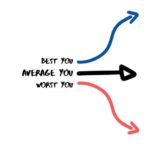Click below to listen to the audio version of this article
In just a couple short months students everywhere will be transitioning into a new stage of life. For many of them, they have been preparing for this their entire lives. And although they will find the working world to be somewhat of a tough change of pace, they will learn to adapt over time — or like most “adults”, they will learn how to blend in.
However, there is one group of people that often have a somewhat different experience when transitioning into society.
Athletes.
For anyone who has spent a large portion of their lives immersed in sports culture and then been forced to leave it all behind, they understand what I mean. And for any athletes who are currently still competing at a high level, there are some important things to keep in mind for when the inevitable fate of “no more sports” becomes a reality.
I went through this stage of life about 3 years ago. In some ways, it was difficult. But it was also a learning experience. And I learned a lot.
Sports culture and everyday culture both have their pros and cons. In my opinion, the latter kind of sucks in comparison. And if I’m being honest, I would love to stay in sports culture for the rest of my life. But for most people, that’s just not a reality (perhaps that’s why I choose to write about it instead).
The athlete transition isn’t easy, but of all the things you’ve ever been through, it is certainly not the most demanding. It simply requires some planning, understanding, and refocusing.
Athletes are unique in a few specific areas. Some of their characteristics may seem a bit odd to the outside world. Meanwhile, some are more in demand than ever before.
Below I have laid out what I believe to be some of the most important secrets to applying an athlete mentality into the “real world”.
1) Knowing Your Environment
I can distinctly remember one of the first times I learned the importance of this rule.
We were having a gathering with the extended family. We had finished eating, and as families typically do, we decided to play a game. I know most of them[my family] well, but the vast majority are not the “competitive” type. We had recently bought a board game version of Family Feud — which is very fitting for what was about to take place next.
Things were going smoothly…
Until a little problem crept up.
During the phase of the game where one person is put on the spot and told to answer the question (without any outside help), the other team was whispering hints and helping the stumped contestant.
I let it slide the first time. The second time I spoke up politely asking to stop. The THIRD time, I lost it!
I slapped my hand firmly on the table and exclaimed “No more cheating!”
Everyone went silent.
They looked at me like I had just slapped Grandma’s teeth out onto the table.
It took a second for the silence to disperse. I don’t distinctly recall what happened next. I think I maybe apologized. Then slunk back into my seat. I Realized my mistake, and let the shame sink in.
Why did I lose my cool like that? I’m not usually a reactive person. But at the same time, THEY WERE CHEATING. I had to say something. Right?
That’s a tough question to answer. But here’s the short answer.
Not everyone is competitive. My parents, my sister, my fiancee, and my close friends. Yes, we are all definitely competitive. And no matter what the game, we’ll do what it takes to win. But not everyone is on this level. To them, a board game is just a fun thing to do. Winning is not the goal, the experience is the fun part.
So the next time someone brings out a deck of cards, or you go bowling with some new friends. Take a second to think about who you’re with, what their compete level is at, and act accordingly.
This is a skill that takes time to develop, but it will serve you well in the long run.
2) Learning a new sport
So I realize holding back that competitive spirit is a difficult request. And you are probably asking yourself, “what am I supposed to do with all these competitive impulses when I’m surrounded by these uncompetitive doormats?”
Easy. Learn a new sport.
You’ve always gloated and boasted that you were a great athlete. Heck, you were probably one of the top athletes in your high school.
Well, now it’s your chance to prove it.
Find a new sport that you can throw yourself into and see how good you can get.
Not only do I recommend a sport that isn’t your expertise, but also consider a sport that counters your strengths. If you played a hand sport, consider a foot sport, or a racquet sport. If you played a full contact sport, dabble in sports that are separated by a net.
The truest test of an athlete is their ability to learn, develop, and excel at any movement. So go out and earn that title you’ve been throwing around your whole life. Prove to yourself that you didn’t achieve your success through physical stature alone. Be an athlete.
3) No butt slaps
This one is fairly straightforward, so I don’t think I need to go into detail on why you need to be careful about it.
Butt slaps, taps, or pats are natural in sports (to an extent), but they are weird at the Monday morning meetings.
Still not convinced? If you need a visual how they will turn out, look no further than The Office:
I know everyone is doing a good job at work but use your kind words instead.
4) Forming new habits
I think for many athletes, this is one of the biggest challenges in the transition phase, but it’s also one of the most rewarding when you can figure it out.
You see the problem is this:
You’ve spent so long creating habits and rituals that revolved around your sport. Every day was filled with particular routines. You needed to eat a certain amount in order to get stronger and have the energy to make it through 4 hours of daily training. Daily practice was where you got to hang out with friends and interact with people. Lifting weights were always targetted towards athletic improvement. Practicing physical movements was your main way of progressing. But you’re now stepping into an environment where those things either no longer naturally exist or they are no longer necessary.
The problem that a lot of athletes face and one that I certainly struggled with, was finding the right balance. For me, this was especially prominent in the area of working out. I was so accustomed to lifting weights and daily practices that I felt as though I had an abundance of extra energy and time.
And so, I worked out like crazy. I managed to gain 20 pounds in the first 3 months after I graduated. Something I had never been able to do during the season or even in the offseason.
This was fun to see how far I could go, but after a while, it got old. I was no longer an athlete, so what was my reason for working out? Talk about an existential crisis.
It wasn’t until rather recently that I formulated a healthy balance in this area. I finally came to the resolution that it’s not about how I look or weigh, but about how I feel. Do I feel strong? Is my body functional? Can I push, pull, press in every way that the human body is intended?
I am still figuring this out as I go, but I now have a solid 4 day per week routine that keeps me feeling strong and healthy, and as a result looking the way I want.
More importantly, I have figured out what is my Minimum Enjoyable Action (MEA). Nir Eyal describes a MEA as a behavior that is simple, easy, and a little enjoyable. When it comes to creating an amateur habit, you need to find a MEA. It gives you a baseline to start from and something you know you can achieve on a regular basis.
I have been through the “expert mode” of working out and that was fine for those current circumstances. But why would I continue an expert level habit for an area I would simply like to maintain amateur status? It’s not worth my time. Unless of course I really want that.
This same idea of a MEA can be applied in forming new habits.
For example, let’s say you want to start reading more, and you really don’t like sitting down to read, and you’re a very slow reader. But you know that books are chalked full of wisdom and you would rather spend your evenings reading instead of Netflixing. Well instead of trying to blast through 6 books in the summer, or reading a book a day like Warren Buffett. Find your MEA. What is the smallest amount you feel like you can do every single day? Maybe it’s 10 pages. Perhaps just 5. Or it could be 20. All you need to do is decide and commit. After a month of establishing this habit, you’ll find it becomes easy and over time you can improve upon it. You just need to understand the importance of progressive and sustainable growth.
However, if you are looking to become an expert in a new area — be it a career or a new hobby. A MEA won’t cut it. That’s what we use for amateur habits.
But don’t worry. You’ve become an expert before.
But how was that achieved? It was done through the daily, deep, deliberate, and intentional practice. And patience.
You already know what’s required, you simply have to adapt it to a new environment.
5) Preparing for delayed feedback
One the most rewarding aspects of any sport is that very often it provides instant feedback. If you misstep, your opponent can take advantage. If you let your guard down, you get punched square in the teeth. If you hit the ball juuuuusst right, you score. And more importantly, if you put enough actions together over a couple hours, you win the game! Or you lose.
In life, it doesn’t always work that way. In the workplace, you are never going to have that glorious moment where the perfect combination of words leads to the game winning conversation with a customer — and then out of nowhere your boss comes in and cheers for your very normal action.
They may give you a pat on the back or say a few kind words to show how much they appreciate you. But it will never compare to how it felt in sports.
Now I’m not stupid. I know you don’t actually think this is some amazing revelation. It’s not like you’ve been locked in some ‘Alcatraz Sports Island’ where the outside world doesn’t exist.
But it does bring up an important issue about the current state of working world, and how you can affect it…
6) Realizing your biggest advantage
One of the greatest issues facing the current workplace is poor communication and relationship development.
Despite the fact that we are more “connected” than ever before, feelings of disconnection and loneliness are on the rise.
I won’t delve into the highly debated topic of whether or not there is something wrong with us millennials. However, I do believe every generation has it’s good and it’s bad traits.
What I know is this, I’ve worked for companies that are comprised of thousands of employees and ones that consist of just 6.
It doesn’t matter how many people are working there, effective communication is one of the most valuable assets available to any organization.
I’ve also spent nearly two decades of my life in team sports. I understand that talent matters. But your ability to communicate is just as important. This is obvious for any team sport, but I also believe the player-to-coach relationship in solo sports is just as crucial, if not more important.
So what’s my point? Well, my point is fairly simple.
You athletes who are about to leave the sports world behind have an extremely significant advantage. While the rest of your classmates have been spending less and less time in front of other people, and more time staring at a device that gives the illusion of connection. You have been staring your teammates in the face. Learning to read their various emotions, developing trust, improving each other’s weak spots, going through hard times, supporting those who fail, relying on others when you are weak, and in the end, celebrating the accomplishment of a common goal.
So with all that being said. I ask you this: Who on earth wouldn’t want you working for them?
Your communication and relationship skills have never been more valuable than they are today. Go out and show the world what you’ve been working on.
It’s Time to Give Back
I think for a lot of people, they see athlete transition as negative, and that they are giving up something extremely important for little in return.
To some extent, this is true.
However, I would argue this: For any athlete who has spent the majority of their lives competing at a high level, you have done a lot of taking and receiving. You have been given a vast number of resources. Coaching, workout facilities, developmental resources, wisdom, hard lessons, joy, fulfillment, and probably the most important of all, a chance to push your limits in a controllable and, somewhat, safe environment. These have all been freely at your disposal.
It’s time to step out of safety and into society. It’s time to remind people why athletes are different and why sports matter more now than ever before.
-DT





